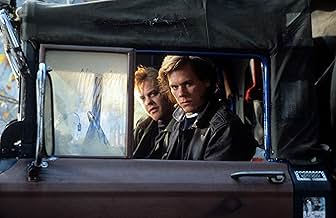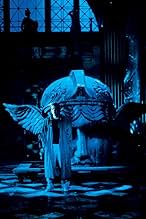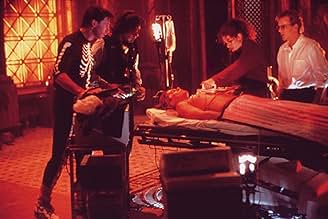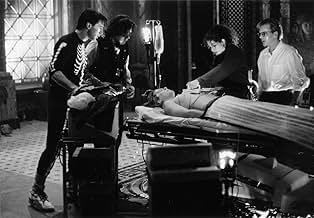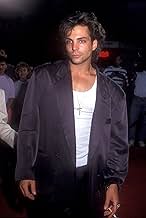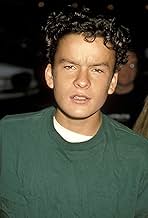Vier Medizinstudenten experimentieren mit "Nahtod"-Erfahrungen, bei denen sie mit tragischen Ereignissen aus der Vergangenheit konfrontiert werden, die auf gefährliche Weise beginnen, ihr Le... Alles lesenVier Medizinstudenten experimentieren mit "Nahtod"-Erfahrungen, bei denen sie mit tragischen Ereignissen aus der Vergangenheit konfrontiert werden, die auf gefährliche Weise beginnen, ihr Leben zu beeinflussen.Vier Medizinstudenten experimentieren mit "Nahtod"-Erfahrungen, bei denen sie mit tragischen Ereignissen aus der Vergangenheit konfrontiert werden, die auf gefährliche Weise beginnen, ihr Leben zu beeinflussen.
- Für 1 Oscar nominiert
- 3 Nominierungen insgesamt
John Duda
- Young Labraccio
- (as John Joseph Duda)
Empfohlene Bewertungen
Hmmm.... Since I love Kiefer Sutherland so much, my review might be a little biased. He was, however, pretty good in Flatliners. A wonderful idea for a movie, and a great gothic-type thriller. Sutherland's guilt and fright at the return of boy he taunted terribly when he was young (I'll try not to give away the rest) seemed genuine, especially since he seems drawn more often than not to act characters that are a**holes (there was really no other way to put it). As a young medical school student, his research into life after death draws his friends into dangerous situations and a great finale. The medical school did seem a little sub-standard, though, I will admit. Kevin Bacon is great in Flatliners, as is one of my favorite sarcastic actors, Oliver Platt. William Baldwin's also a cutie and did okay, and though I'm not a Julia Roberts fan, so did she. The plot will draw you in and keep you on the edge of your seat, and there's an interesting dark atmosphere pervaded by a lot of red and blue for emotional impact. A good movie.. I'd give it at least an 8 out of 10
The basic premise of Flatliners is fairly simple. Several medical students put themselves at the point of death in order to find out exactly what the brain does during the fact. It sounds like something a mob of bored students would do for a joke, but it forms the basis of some very creepy substories. In today's world, where Hollywood has to mine foreign markets for the ideas to make a horror film, Flatliners is one of those rare gems that show Hollywood can make something different when it tries hard enough.
What separates Flatliners from a lot of films based on this premise that would come out today is that it does not stoop to being condescending or arrogant. Flatliners recognises that people go to films to be entertained, not moralised to. In this kind of supernatural thriller, the difference this restraint makes is really incredible. What's even more incredible is that Julia Roberts appears without being annoying or demonstrating that she can only play Julia Roberts. The theory of obscurity, that performing artists do their best work with the smallest audience, is in force here.
The subplots concerning what the characters find during their loss of pretty much everything that makes them alive, and how it comes back to intrude on their present time, are done surprisingly well. The moments when William Baldwin's character finds his personal videotape collection coming back to haunt him are especially intriguing. That William Baldwin seems so perfectly cast in the role says a lot either about the script or the direction. I am not sure which.
Kiefer Sutherland, on the other hand, really shines as the lead. One really feels for him as the mystery of what past experience is intruding on the present and why unfolds. As Kevin Bacon's character goes to find an old school pier whose life he made hell and tell her how sorry he is, it becomes clearer what the film is about. We can try to change the past as much as we like, but it's what we do with the present that matters most.
Another good aspect of Flatliners is how it achieves an atmosphere without the use of expensive, elaborate visual effects. Quite unusually for what is essentially a horror film, Flatliners did not expend its budget in places where it did not need to. Much of what we see during the more surreal sequences is a case of professional pretending, simple trick photography, or stock footage. Sometimes the simplest things are the best.
If there is a problem with the film, it's that it feels about ten minutes too short. The ending seems more perfunctory than conclusive, as if someone in the studio asked the director to wrap the film up so they can bring it out at a certain market time. Of course, many films have been left with sore spots for this very reason, so Flatliners shouldn't really need to be any different. The hundred and fifteen minutes we do get is highly satisfactory, though not overly brilliant.
I gave Flatliners a seven out of ten. It works well as a date flick or a kind of late-night popcorn film. That aside, it makes a good reminder that low-budget horror shows weren't always sad pieces of garbage.
What separates Flatliners from a lot of films based on this premise that would come out today is that it does not stoop to being condescending or arrogant. Flatliners recognises that people go to films to be entertained, not moralised to. In this kind of supernatural thriller, the difference this restraint makes is really incredible. What's even more incredible is that Julia Roberts appears without being annoying or demonstrating that she can only play Julia Roberts. The theory of obscurity, that performing artists do their best work with the smallest audience, is in force here.
The subplots concerning what the characters find during their loss of pretty much everything that makes them alive, and how it comes back to intrude on their present time, are done surprisingly well. The moments when William Baldwin's character finds his personal videotape collection coming back to haunt him are especially intriguing. That William Baldwin seems so perfectly cast in the role says a lot either about the script or the direction. I am not sure which.
Kiefer Sutherland, on the other hand, really shines as the lead. One really feels for him as the mystery of what past experience is intruding on the present and why unfolds. As Kevin Bacon's character goes to find an old school pier whose life he made hell and tell her how sorry he is, it becomes clearer what the film is about. We can try to change the past as much as we like, but it's what we do with the present that matters most.
Another good aspect of Flatliners is how it achieves an atmosphere without the use of expensive, elaborate visual effects. Quite unusually for what is essentially a horror film, Flatliners did not expend its budget in places where it did not need to. Much of what we see during the more surreal sequences is a case of professional pretending, simple trick photography, or stock footage. Sometimes the simplest things are the best.
If there is a problem with the film, it's that it feels about ten minutes too short. The ending seems more perfunctory than conclusive, as if someone in the studio asked the director to wrap the film up so they can bring it out at a certain market time. Of course, many films have been left with sore spots for this very reason, so Flatliners shouldn't really need to be any different. The hundred and fifteen minutes we do get is highly satisfactory, though not overly brilliant.
I gave Flatliners a seven out of ten. It works well as a date flick or a kind of late-night popcorn film. That aside, it makes a good reminder that low-budget horror shows weren't always sad pieces of garbage.
As the remake is coming out this week, I want to see how the original did, and I am not disappointed. This movie is a thriller without gore. The idea of forcing near death experience is intriguing and the stories around the characters are interesting. But what made it super special is that it featured the best stars at the time -- Julia Robert, Kevin Bacon, Kiefer, Oliver Plat and William Bacon, all together in one movie. And all the stars delivered their great performances. As for the remake, the bad news is it is very hard for it to surpass the original as the latter set such a high standard. But the good news is we can always have the original to be appreciated, in case the remake is a flop.
Flatliners has all the ingredients of a good Joel Schumacher film - intelligent, youthful characters, stunning cinematography, a gripping story, and excellent performances. It's escapist fun but it's done very well and resonates with a positive spiritual message despite the unnerving precedings.
Schumacher has a knack for spotting talented young actors, and all of the main five here have gone on to greater things (see the cast list). Their believable performances help to raise this movie well above average. Kiefer Sutherland shines in his egotistical med-student role.
The cinematography really stimulates the right side of the brain, which is what I love about Schumacher; his use of light and location create images that stick. A disturbing nightmarish atmosphere is created which unsettles you while you watch the film and haunts you when you go to bed - reminded me of The Lost Boys.
This is a film that takes an awesome premise - curious students want to find out what's after death, and successfully follows it through into a scary, gripping tale of redemption. One of Schumacher's best; highly recommended.
Schumacher has a knack for spotting talented young actors, and all of the main five here have gone on to greater things (see the cast list). Their believable performances help to raise this movie well above average. Kiefer Sutherland shines in his egotistical med-student role.
The cinematography really stimulates the right side of the brain, which is what I love about Schumacher; his use of light and location create images that stick. A disturbing nightmarish atmosphere is created which unsettles you while you watch the film and haunts you when you go to bed - reminded me of The Lost Boys.
This is a film that takes an awesome premise - curious students want to find out what's after death, and successfully follows it through into a scary, gripping tale of redemption. One of Schumacher's best; highly recommended.
I recall seeing this movie three times, first in the early 90s, then 00s and now I just saw it again and each time I've grown more fond of it. There is something in Schumachers style that drags me into it. The story is OK, nothing really remarkable. It's one part ghost story, one part medical thriller, one part love triangle.
What really makes this movie worthwhile is Schumachers direction. He's got a very good eye for this Gothic style. One might wonder why the school was so poorly lit, or what exactly was the place they did their experiments at, but it's all for the mood, it's all style. Sometimes style does go over substance, but in this case they work hand in hand. The Gothic architecture and gloomy late autumnal Chicago are just what this movie needed. Just like The Lost Boys IS small town sunny California. Schumacher should've stuck to this style which clearly is his forte, but sadly he has since had a very varying career with only occasional hits.
The cast is great, all of the stars have gone a long way since. Makes one only wonder what could've become of William Baldwin had he made better career moves. He is very good in this movie. I've always liked Kiefer Sutherland as a movie actor, and he does a remarkable job here too. I really would've rather seen him as a full time movie actor rather than going for TV.
There is only one thing that bothers me in this movie and it's the story in all it's simplicity. If people have had near death experiences before and have come back to tell, what new did this crew try to achieve? If not only have personal experience of death, but I got the idea most of them were in it for the science. Why risk brain damage and gamble with life for something you will not get any proof anyway. Especially given that they are medical students, the story is not 100 % believable, but like I stated earlier, watch this movie more for the mood.
I'm glad it's already been so long since the 90s so one can start appreciate the movies of this decade again without getting caught on the hairdos and such.
What really makes this movie worthwhile is Schumachers direction. He's got a very good eye for this Gothic style. One might wonder why the school was so poorly lit, or what exactly was the place they did their experiments at, but it's all for the mood, it's all style. Sometimes style does go over substance, but in this case they work hand in hand. The Gothic architecture and gloomy late autumnal Chicago are just what this movie needed. Just like The Lost Boys IS small town sunny California. Schumacher should've stuck to this style which clearly is his forte, but sadly he has since had a very varying career with only occasional hits.
The cast is great, all of the stars have gone a long way since. Makes one only wonder what could've become of William Baldwin had he made better career moves. He is very good in this movie. I've always liked Kiefer Sutherland as a movie actor, and he does a remarkable job here too. I really would've rather seen him as a full time movie actor rather than going for TV.
There is only one thing that bothers me in this movie and it's the story in all it's simplicity. If people have had near death experiences before and have come back to tell, what new did this crew try to achieve? If not only have personal experience of death, but I got the idea most of them were in it for the science. Why risk brain damage and gamble with life for something you will not get any proof anyway. Especially given that they are medical students, the story is not 100 % believable, but like I stated earlier, watch this movie more for the mood.
I'm glad it's already been so long since the 90s so one can start appreciate the movies of this decade again without getting caught on the hairdos and such.
Wusstest du schon
- WissenswertesDuring pre-production, the actors worked with medical technical advisor Ruth F. Ekholm, who tutored them on the proper medical procedures for the scenes in which the students flatline on the EKG and EEG machines, signaling cardiac and brain death, respectively. They also took advantage of Peter Filardi's research of published accounts from people who'd had near-death experiences. Almost all accident victims reported a tunnel leading to a beautiful white light and friendly voices. People who had attempted suicide had troubled, emotionally painful near-death experiences.
- PatzerWhile a defibrillator is of no use if a patient has truly flatlined, a patient in a "fine v-fib" rhythm can appear to have flatlined but still be revived with the paddles. Therefore, when in doubt, the Advanced Cardiac Life Support guidelines call for administering the shock, though it's not the treatment of choice.
- Zitate
[first lines]
Nelson Wright: Today is a good day to die.
- SoundtracksPARTY TOWN
Written and Performed by David A. Stewart (as Dave Stewart)
Courtesy of BMG Records (UK) Ltd.
Top-Auswahl
Melde dich zum Bewerten an und greife auf die Watchlist für personalisierte Empfehlungen zu.
Details
- Erscheinungsdatum
- Herkunftsland
- Sprache
- Auch bekannt als
- Línea mortal
- Drehorte
- Museum of Science & Industry - 57th & Lake Shore Drive, Jackson Park, Hyde Park, Chicago, Illinois, USA(exteriors: Tait Building)
- Produktionsfirmen
- Weitere beteiligte Unternehmen bei IMDbPro anzeigen
Box Office
- Budget
- 26.000.000 $ (geschätzt)
- Bruttoertrag in den USA und Kanada
- 61.489.265 $
- Eröffnungswochenende in den USA und in Kanada
- 10.034.685 $
- 12. Aug. 1990
- Weltweiter Bruttoertrag
- 61.489.638 $
- Laufzeit
- 1 Std. 55 Min.(115 min)
- Farbe
- Sound-Mix
- Seitenverhältnis
- 2.39 : 1
Zu dieser Seite beitragen
Bearbeitung vorschlagen oder fehlenden Inhalt hinzufügen



